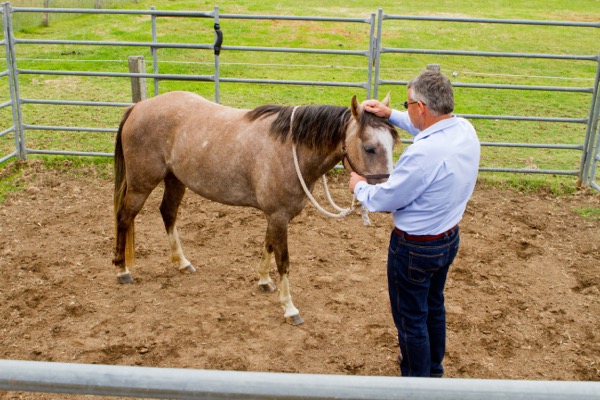A horse is a very sensitive creature.
He can feel the lightest touch of your hand and the slightest squeeze of your leg.
He can hear the slightest rustle in the bushes and feel the smallest fly land on his back.
This is how a horse is made.
There’s nothing you or anyone else can do to stop any horse feeling and hearing the way that he does.
People often say their horse is ‘super sensitive’ because he’s easily startled and jumps and reacts to the smallest movement or sound.
Others say their horse takes fright and runs away when he sees something new.
The truth is that the horses in this example are no more sensitive than any other horse in the world.
They can feel and hear just the same.
The problem is that they’re nervous and worried and haven’t been taught to be relaxed and confident.
When a horse shies at a rustling bush or takes fright at a saddle blanket or bucks with the saddle, it’s because he’s nervous and not relaxed.
He reacts because he’s worried and frightened.
It’s got nothing to do with how sensitive he is.
You can’t make any horse less sensitive.
Horses can’t be desensitised.
However, you can build a horse’s confidence and teach him to trust you.
When a horse is frightened, his confidence must be built one step at a time.
This won’t be achieved by constantly exposing him to things that worry and frighten him.
The first thing you must do with every horse is go to him and show him that you’re not going to hurt him.
Simply go to your horse and rub his head and give him a pleasant experience.
Every horse must learn that it’s always easy and pleasant to be with you.
He must also learn that you never do anything to frighten him.
You must be consistent every time you’re with your horse – whether you’re riding, leading, feeding or even cleaning his stable.
If you’re nice to your horse one minute and then suddenly start flapping something around, he’ll soon learn that you’re unreliable.
Your horse will never trust you because he’ll never know when you might start flapping something at him.
It makes no sense to a horse to be standing quietly one minute and the next minute have something flapping around him.
From a horse’s point of view, there’s no rhyme or reason to your actions and he’ll never know when the flapping might start again.
Your horse will never learn to trust you if you’re inconsistent.
My Foal Handling Online Clinic shows how consistent handling, without frightening the horse, builds confidence.
Here’s the good news:
You don’t have to flap anything around any horse in order to prepare him for a rustle in the bushes or a plastic bag blowing along the road or to be saddled for the first time.
If you’ve built your horse’s confidence one step at a time and taught him to listen and try for you, he’ll always concentrate on you and what you want, even when he hears something rustling or when a plastic bag blows past.
Training horses is always about building confidence and teaching one step at a time.
It should never be about confronting a horse with things that frighten him.
Exposing a horse to things that frighten him won’t ‘desensitise’ him.
Constant exposure to new things won’t ‘densensitise’ any horse.
You can’t possibly expose a horse to everything that he’ll ever come across.
Imagine going to your first show.
You’d have to spend hours walking your horse around to expose him to all the new things that he sees.
And when you go to your next show, you’d have to do it all over again.
However, if you teach your horse to be confident and relaxed and to move forward and give, you’ll be able to control him in every situation.
Your horse will learn that you never do anything to frighten him.
Whenever you come across something new, you’ll be able to make him listen and concentrate on you and to move exactly where you ask, at the speed you ask.
When he hears a rustle in the bushes or sees a plastic bag, he’ll still listen and concentrate and try for you because you’ve taught him that’s the most important thing to do.
So when you take him to his first show, or somewhere new out on the trail, he’ll be busy doing as you ask and won’t even look left or right.
You must always use as little pressure as possible whenever you work with any horse.
This is especially true if your horse is worried and frightened.
There’s never any need to increase the level of pressure by flapping things at any horse at any stage of his education.

